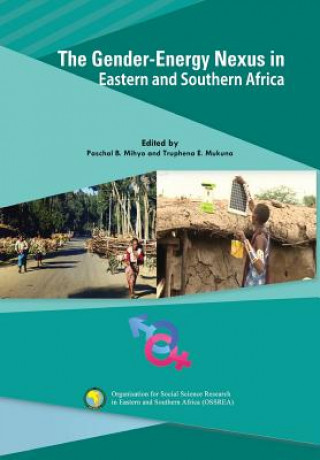
Kod: 14230716
Gender-Energy Nexus in Eastern and Southern Africa
Autor Paschal B. Mihyo, Truphena E. Mukuna
The Regional Economic Communities (RECs) in Eastern and Southern Africa have been at the forefront to developing new energy policies and programmes aimed at reaching the UN goal of Ensuring Access to Clean Energy for All by 2030. ... więcej
- Język:
 Angielski
Angielski - Oprawa: Miękka
- Liczba stron: 322
Wydawca: OSSREA, 2015
- Więcej informacji o książce

Zobacz książki o podobnej tematyce
-

Dune
34.83 zł -33 % -

Haunting Adeline
125.75 zł -1 % -

Berserk Deluxe Volume 2
212.54 zł -1 % -

White Nights
15.29 zł -23 % -

Powerless
48.72 zł -11 % -

Atomic Habits
59.19 zł -26 % -

Dune Messiah
46.31 zł -3 % -

Berserk Deluxe Volume 3
218.08 zł -3 % -

One Day
32.61 zł -36 % -

Berserk Deluxe Volume 1
211.73 zł -2 % -

Iron Flame
61.11 zł -28 % -

Surrounded by Idiots
36.74 zł -28 % -

Harry Potter and the Prisoner of Azkaban (Minalima Edition)
170.35 zł -2 % -

Gravity Falls Journal 3
89.40 zł -

Heaven Official's Blessing: Tian Guan Ci Fu (Novel) Vol. 1
85.57 zł -5 % -

The Creative Act
100.17 zł -15 % -

Dune
47.31 zł -23 % -

Hunting Adeline
126.45 zł -4 % -

A Little Life
47.01 zł -14 % -

Children of Dune
46.71 zł -2 % -

Heaven Official's Blessing: Tian Guan Ci Fu (Novel) Vol. 2
77.72 zł -14 %
Powiadomienie o dostępności
Wpisz swój adres e-mail, aby otrzymać od nas powiadomienie,
gdy książka będzie dostępna. Proste, prawda?
Więcej informacji o Gender-Energy Nexus in Eastern and Southern Africa
 Opis
Opis
The Regional Economic Communities (RECs) in Eastern and Southern Africa have been at the forefront to developing new energy policies and programmes aimed at reaching the UN goal of Ensuring Access to Clean Energy for All by 2030. In the year 2006, the East African Community passed the EAC Strategy to Scale Up Access to Modern Energy Services, committing its Member States to reach the UN goal of "access to all" by 2030. The Inter-governmental Authority for Development adopted its Environmental and Natural Resources Policy in 2007 which includes issues of renewable energy. The Common Market for Eastern and Southern Africa launched its Model Energy Programme in 2012, followed the same year by its comprehensive baselines database on renewable resources covering all its Member States. In the year 2009, the African Union General Assembly at its 12th Ordinary Session adopted the Policy on "Scaling Up Renewable Energy in Africa". The regional policies have been domesticated by Member Sates of the RECs. Although their targets are very ambitious, implementation programmes launched at national level are robust and producing results. Both in the policies and implementation programmes, gender issues have, however, not featured prominently. Noting this deficit, the Organisation for Social Science Research in Eastern and Southern Africa called for researchers to assess the extent to which energy policies in Eastern and Southern Africa have taken gender issues on board. This book is the product of that project. It has ten chapters that investigated the gender-energy nexus in Zimbabwe, Ethiopia, Tanzania, Swaziland, Sudan and Kenya. The book will prove useful to all policy makers, researchers and analysts who may be interested in strengthening the gender content of the programmes as we move towards 2030. We believe it triggers and helps policy makers and researchers to create platforms to use its findings, and those of others, to see how in gender terms those at the bottom of the energy access pyramid can be factored into these programmes, to make sure they are not left behind.
 Szczegóły książki
Szczegóły książki
- Pełny tytuł: Gender-Energy Nexus in Eastern and Southern Africa
- Autor: Paschal B. Mihyo, Truphena E. Mukuna
- Język:
 Angielski
Angielski - Oprawa: Miękka
- Liczba stron: 322
- EAN: 9789994455843
- ISBN: 9994455842
- ID: 14230716
- Wydawca: OSSREA
- Waga: 513 g
- Wymiary: 244 × 170 × 17 mm
- Data wydania: 29. December 2015
zadowolonych klientów
Od roku 2008 obsłużyliśmy wielu miłośników książek, ale dla nas każdy był tym wyjątkowym.
Copyright! ©2008-24 libristo.pl Wszelkie prawa zastrzeżonePrywatnieCookies



 21 milionów książek
21 milionów książek Dostawa 10.99 zł
Dostawa 10.99 zł (32) 444 93 66 (8-15.30h)
(32) 444 93 66 (8-15.30h)